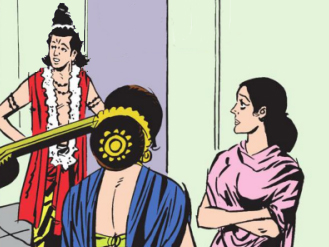CHAPTER CXXXIV
(THE HISTORY OF THE PUNYAKA RITE)
Janamejaya said:—O foremost of the twice-born, by the grace of Dwaipāyana you are informed of all things. Relate to me, therefore, the origin of the religious rite of Punyaka (1).
Vaishampāyana said:—O foremost of the pious kings, hear, how, according to the ordinances of Umā, the rite of Punyaka was introduced before amongst mankind (2) O sinless king, after the tree Pārijāta had been carried away from the celestial region by Krishna of unwearied actions, the battle between the gods and demons had commenced and the dreadful slaughter of the Dānavas, of Shatpur, had been brought about the intelligent Muni Nārada went to the city of Dwāravati (3–4). O king, after the goddess-like Jāmvavati, the honorable Satyabhāna, the ascetic daughter of the king of Gāndhāra and numberless other virtuous, chaste and accomplished wives of Keshava had assembled there, Rukshmini, the daughter of Bhishma, asked the foremost of Brāhmanas Nārada, well read in theology, who was there with Krishna. Rukshmini said:—"O Muni, O foremost of speakers and virtuous men, we are greatly stricken with curiosity to listen to an account of the origin of pious rites, the rules regulating their performance, fruits, time and gifts connected with them. Kindly remove it by describing them in detail (5-9)."
Narada said:—O sinless lady Vaidharbi, cognizant of religious rites, hear how Umā described the regulations of the Punyaka rite in the days of yore (10). O goddess, on one occasion, the goddess Umā, of pure vows, performed the religious rite of Punyaka; and at the termination of the ceremony she invited all her friends. Aditi and other daughters of Daksha of indomitable energy, Pulomā's daughter Sachi, renowned in the world for her devotion to her husband, the great Sati, Soma's beloved spouse Rohini, Purvaphalguni, Revati, Shatabhisā and Maghā had all come there before and had been worshipping the great goddess Umā (11–14). The worshipful presiding goddesses of the charming rivers Gangā, Saraswati, Vena, Godā, Vaitarani, Gandaki and others, the auspicious and chaste lady Lopamudrā and others who, all, by virtue of their own prowess, have been upholding the universe, the auspicious daughters of the mountains, the daughters of the fire, of firm vows, Shāhā, the wife of the Regent of fire, the illustrious goddess Sāvitri, Hriddhi, the beloved wife of Kuvera, the queen of the lord of waters, the wife of the Regent of departed manes, the wives of Vasus, the ascetic and vow-observing Hri, Shree, Dhriti, Kirti, Ashā, Medhā, Priti, Mati, Khyāti, Sannati and other chaste ladies, ever engaged in the well-being of creatures, (were all present there) O highly youthful lady. At the termination of the ceremony Amvikā, with mountains of various corns and jewels, cloths of various colours and most excellent ornaments, honored them all (15-21). Having accepted the offerings of the goddess those chaste ascetic ladies took their seats and engaged in conversation on different topics (22). O thou having thy husband as thy god, when the subject of the Punyaka rite was cropped up in the course of their conversation the goddess spoke many things about it and of the regulations regarding its performance (23).
Thereupon with the consent of that assembly of chaste ladies Arundhati, the daughter of Soma, addressed the goddess Umā about the most important regulation regarding the Punyaka rite (24). O Vaidarbhi, to please them all, the goddess Umā, compassing the well-being of all creatures, gave them an account of religious rites in my presence (25). O fair one, at that time Umā made over the mountain of jewels to me; and I too, having accepted that present, dedicated it to the service of the Brāhmanas (26). O auspicious lady, listen, with all these (ladies), to what I saw about the Punyaka rites and what Umā said to the chaste Arundhati. I shall relate it in full from the very beginning (27-28).
Source: https://archive.org/details/AProseEnglishTranslationOfHarivamsh
| Previous | | Source | | Tamil Translation | | Next |
